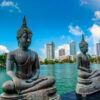Letter from Managing Editor
On July 5, the globally respected London-based weekly The Economist (estb.1843) featured a cover story titled ‘How India is failing its women’. The feature detailed that women’s participation in contemporary India’s workforce is lower than in any G20 country except Saudi Arabia, and contributes only one-sixth of GDP. A week earlier on June 28, a report of the London-based Thomson Reuters Foundation shocked the Indian establishment by ranking India the world’s most dangerous country for women, more threatening than Afghanistan, war-torn Syria and Saudi Arabia.
These reports preceded the #metoo tsunami originating in the US which swept over India last month (October) with several accomplished women professionals from the media and entertainment industries naming and shaming several powerful editors and movie moguls who were lording it over these high-profile industries. As numerous highly educated women broke their silence and posted stories of sexual harassment and intimidation in their workplaces on social media, the hitherto covered up reality that girl children and women — illiterate, educated, employed in organised/unorganised sectors — are experiencing sexual harassment including lewd language, touching, groping, stalking and worse on a daily basis, has provoked nationwide outrage, particularly within the country’s 600 million women citizens.
Against this backdrop of women across the country having shed their traditional inhibitions about naming and shaming sexual predators be they ever so high, there’s growing awareness, particularly within middle class India of the importance of educating male children about gender equality, sensitivity and respect. Suddenly, there’s rising fear of boys — invariably the spoilt darlings of the family — being named, shamed and disgraced, even if not ruined, for sexually aberrant behaviour and misconduct. Although die-hard patriarchs and incorrigible males tend to dismiss India’s #metoo movement as a storm in a teacup, make no mistake it’s a defining moment in the country’s inegalitarian social history. Parents who ignore its implications could live to see their dreams and ambitions for their darling sons go up in smoke. You have been warned!
There’s much else in this issue of ParentsWorld. Check out the Middle Years section on ways and means to boost children’s cognitive capabilities, a report on the disturbing teen suicides epidemic and Dr. Gita Mathai’s insightful column on the importance of including minerals-rich foods in family diets. Also read our Interview with Neerja Birla, the hands-on chairperson of the Aditya Birla Education Trust.
Happy Diwali!n July 5, the globally respected London-based weekly The Economist (estb.1843) featured a cover story titled ‘How India is failing its women’. The feature detailed that women’s participation in contemporary India’s workforce is lower than in any G20 country except Saudi Arabia, and contributes only one-sixth of GDP. A week earlier on June 28, a report of the London-based Thomson Reuters Foundation shocked the Indian establishment by ranking India the world’s most dangerous country for women, more threatening than Afghanistan, war-torn Syria and Saudi Arabia.
These reports preceded the #metoo tsunami originating in the US which swept over India last month (October) with several accomplished women professionals from the media and entertainment industries naming and shaming several powerful editors and movie moguls who were lording it over these high-profile industries. As numerous highly educated women broke their silence and posted stories of sexual harassment and intimidation in their workplaces on social media, the hitherto covered up reality that girl children and women — illiterate, educated, employed in organised/unorganised sectors — are experiencing sexual harassment including lewd language, touching, groping, stalking and worse on a daily basis, has provoked nationwide outrage, particularly within the country’s 600 million women citizens.
Against this backdrop of women across the country having shed their traditional inhibitions about naming and shaming sexual predators be they ever so high, there’s growing awareness, particularly within middle class India of the importance of educating male children about gender equality, sensitivity and respect. Suddenly, there’s rising fear of boys — invariably the spoilt darlings of the family — being named, shamed and disgraced, even if not ruined, for sexually aberrant behaviour and misconduct. Although die-hard patriarchs and incorrigible males tend to dismiss India’s #metoo movement as a storm in a teacup, make no mistake it’s a defining moment in the country’s inegalitarian social history. Parents who ignore its implications could live to see their dreams and ambitions for their darling sons go up in smoke. You have been warned!
There’s much else in this issue of ParentsWorld. Check out the Middle Years section on ways and means to boost children’s cognitive capabilities, a report on the disturbing teen suicides epidemic and Dr. Gita Mathai’s insightful column on the importance of including minerals-rich foods in family diets. Also read our Interview with Neerja Birla, the hands-on chairperson of the Aditya Birla Education Trust.
Happy Diwali!
















Add comment